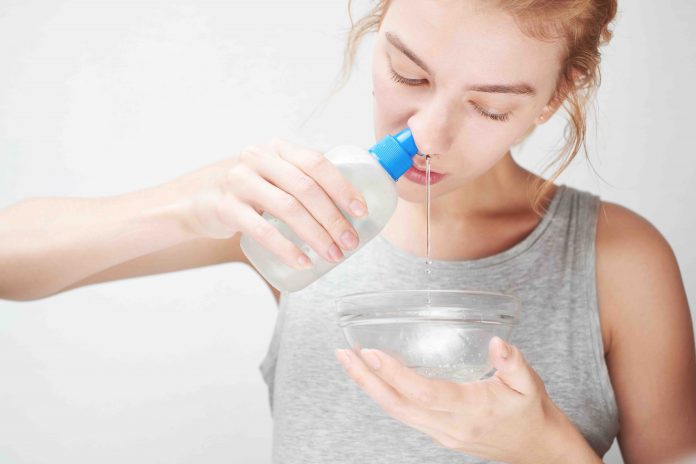Nasal irrigation (NI), a practice rooted in ancient traditions, has gained significant popularity in recent years as a natural remedy for various nasal conditions. This technique involves flushing the nasal passages with a saline solution to remove irritants, allergens, inflammatory medications, and excess mucus, and reduce the viral load in the nasal cavities.
As pharmacists, it’s essential to understand the safety and efficacy of NI to guide our customers effectively.
Safety
When performed correctly, NI offers a host of benefits with only minimal side effects experienced by some patients, such as local irritation, itching and a burning sensation in the nasal cavity.1
ENT specialist Dr Patrick Walsh supports the use of NI and recommends using a saline rinse, such as Nasal FLO, at least twice a day after septum and sinus surgery.2
NI helps maintain nasal hygiene, improves nasal function, and reduces the risk of infections without any major adverse effects.
While NI is generally safe, it’s not suitable for everyone. Patients with a deviated septum, frequent nosebleeds, or a history of ear infections should consult their healthcare provider before starting NI. It’s also important to use a proper saline solution and follow hygiene practices to prevent contamination.
Proper technique
To ensure safe and effective NI, it’s crucial to follow the proper technique. Start by preparing a saline solution using distilled or sterilised water and pre-measured saline. The solution should be lukewarm.
When using a nasal irrigator device, such as a neti pot or squeeze bottle, Dr Lucy Matthew, ENT surgeon at Melbourne ENT Group, advises that the head should be tilted sideways over a sink, then the spout inserted into one nostril, allowing the solution to flow through and out of the other nostril.3<superscript> The process should be repeated on the other nostril.
Breathing through the mouth is important during the process, to avoid swallowing the solution.
It’s crucial to emphasise the use of sterile saline solutions to minimise the risk of contamination and infection. Proper hygiene and maintenance of NI devices are essential to ensure safe and effective results.
Patients are also recommended to avoid performing sinus rinses within 60 minutes of going to bed, as saline may drain down the back of the throat and disrupt sleep.
The role of saline solution
The use of saline, as opposed to basic distilled or sterilised or tap water, is based on scientific evidence and expert recommendations. Saline has a few key advantages, including:
Maintaining nasal moisture. Saline closely mimics the body’s natural fluids, preventing excessive dryness or irritation of the nasal passages. It helps maintain optimal moisture levels.
Enhancing mucus clearance. Saline acts as a gentle osmotic agent, promoting the clearance of mucus, allergens and irritants from the nasal passages. This flushing action can alleviate nasal congestion and reduce the frequency of respiratory infections.
Reducing inflammation. Saline has mild anti-inflammatory properties that can soothe nasal tissues and reduce swelling. This can be particularly beneficial for individuals with chronic sinusitis or allergic rhinitis.
Nasal irrigation in a daily routine
NI can be a valuable addition to daily nasal care routines, especially for individuals prone to allergies or recurrent sinus infections. It’s important to guide customers on the proper technique and device selection. Recommending pre-packaged saline solutions, such as ready-to-use nasal sprays or squeeze bottles, ensures convenience and safety.
References:
- ncbi.nlm.nih.gov/pmc/articles/PMC6848701/
- drpatrickwalsh.com.au/post-operative-care/
- youtube.com/watch?v=UXU_slhhwTM&t=159s
Written by Irene Vergos.
This feature was originally published in the August issue of Retail Pharmacy magazine.




